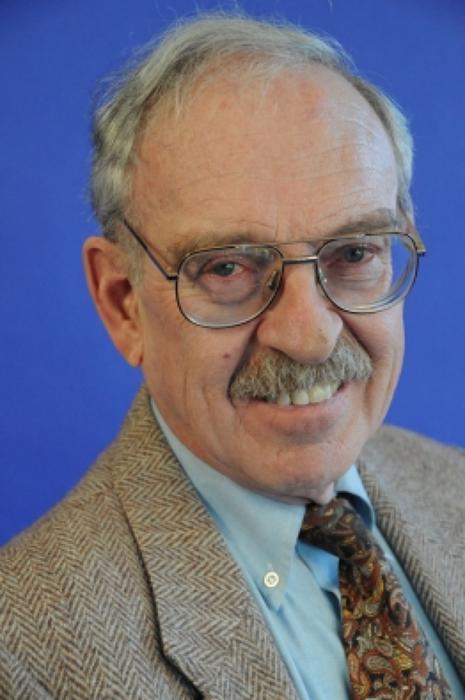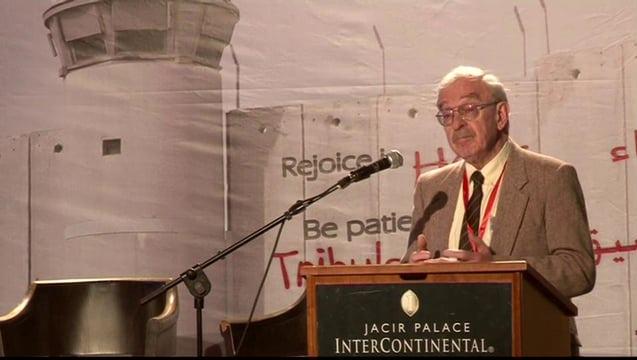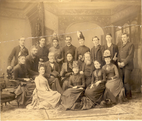Dr. Ron Sider, an important forerunner promoting social justice among evangelical churches in the last 40 years, visited Aisa in April and May, 2015. During his journey, he visited Beijing and Shanghai, which is the first trip in his life to Mainaland China. Dr. Sider also visited some churches in China, which left a deep impression on him.
In the latest interview with China Christian Daily (CCD) after his journey, Dr. Sider recalled his expeience and shared his impression about China's church. He was also asked to comment on the Evangelical Movement, which is the most major Christianity movement in the last about 70 years. Apart from these, he also gave advice to the young evangelical church in China how to study and follow the movement.
Especially, as the author of many books on how to balance evangelism and social work, such as Good News and Good Works: A Theology for the Whole Gospel, Churches That Make a Difference and Cup of Water, Bread of Life, he shared his thoughts and ideas about this topic to the China's church which is now facing the tension between evangelism and social action.
The interviewed was conducted in English by e-mail. Dr. Sider sent his answers in text and then Christian Times translates all the questions and answers to Chinese.
CCD: Dr. Sider, is this your first time for you to visit China and come into contact with churches in Mainland China? What's your impression about churches in Mainland China?
Dr. Sider: My strongest impression about the church in China is its vitality, vigorous faith and wonderful growth. I love the way everyone says "Amen" after each sentence during public prayers in the churches.
CCD: You've been to many churches in different areas. From your point of view, what are the features and strengths of Chinese churches? And what role do you think Chinese churches could play in world Christianity?
Dr. Sider: The passionate evangelism of Chinese churches is a tremendous strength. And your vision to share the Gospel everywhere (e.g. The "Back to Jerusalem" vision) is a great gift to the world-and it will be more and more influential as more and more Christians in China are part of a rich nation with vast economic resources.
CCD : Evangelical movement is one of the major and important movements in the past 70 years. In the last five to ten years, Chinese churches also start to pay their attention to the movement and some local churches have begun to study and follow this movement. As an important evangelical leader who makes a big contribution to this movement and also a theologian, what suggestions and cautions do you have for those Chinese churches following the movement? From the Evangelical movement, is there any good thing that Chinese church should adopt? On the other hand, is there anything from the movement that Chinese church should avoid and be cautious of?
Dr. Sider: I find it encouraging that important parts of the Chinese church are embracing a vision of mission that combines word and deed. That is in keeping with the global evangelical movement which has moved in the last 50 years from placing almost all the emphasis on evangelism to combining evangelism and social ministry. My plea is to maintain biblical balance. Here and there some evangelicals in some places have become so focused on social action that they have neglected evangelism-thus repeating the same mistake in the earlier part of the 20th century when the "Social Gospel" movement focused on social action and almost entirely abandoned evangelism. Please do not repeat that mistake. Biblical Christians will follow Jesus and love the whole person, body and soul.
CCD: In your last decades of service life, you have been devoted to arousing awareness of the churches to social justice and social service. In the past decade, more and more pastors in China, especially those from the new emerging churches in cities, started to be aware and emphasize these issues. Meanwhile some Chinese pastors from conservative churches think we should pay more attention to church-inner-growths such as pastoring and evangelizing. In a way, we can probably say Chinese church is now in a period of transition in which we are to face tensions from evangelism and social services.
As we know, you've thought and published a lot of about these topics. Could you give some suggestions to Chinese churches on how to balance ourselves between church's inner growths and our involvement in social responsibilities and how we should deal with the tensions between from both sides?
Dr. Sider: The best way to deal with tension between those promoting only or primarily evangelism and those promoting only or primarily social action is to be vigorously engaged in both and thus demonstrate how the two fit so well together. People need a living personal relationship with Jesus which brings forgiveness of sins and the transforming power of the Holy Spirit. But they also need a generous sufficiency of the material things that enable them to have adequate food, clothing, housing, education,, etc. When there is material need, Christians act to love and serve their neighbors by helping to meet material and social needs.
CCD: Another question is how can we keep ourselves remaining deeply rooted in profound biblical foundation along with promoting social service and social justice?
Dr. Sider: The key is uncompromising commitment to all that the Bible teachesus. That means we follow Jesus' example and therefore both preach andmeet material needs. Jesus said there are two great commandments: love God and love neighbor. One is not loving one's neighbor if that neighborhas pressing social/material needs and we fail to provide generous help. The Gospels show that Jesus devoted a lot of potential time that he could have devoted just to preaching but instead spent that time healing sick bodies. Jesus is our only perfect example.
CCD: Dr. Sider, you have worked for arousing churches'attention to social services and justice since you were young. When you look back to all these past decades of your service life, what are the main stages do you see you have been through in such a long time? What differences do youhave when you compare your current self to what you were at the very beginning? Do you have any new thoughts about social service now?
Dr. Sider: I do not see a lot of change in my thinking/acting over thelast four decades. From the beginning forty plus years ago when I sensed a call from God to try to promote greater evangelical social concern for peace and justice, I determined that I would remain strongly rooted in historic biblical faith, orthodox theology and a passion for evangelism. One ofthe greatest joys of my life has been to watch the global evangelical movement more and more embrace that biblical balance.
CCD: Last question. You have witnessed the changes and advancements of evangelical church involvements in social services in the past few decades. In your opinion, what are the main advances in these years? And in what areas should we still work hard on?
Dr. Sider: In 1974, at the first Lausanne Congress on World Evangelization (the largest global gathering of evangelicals up to that time),the resulting Lausanne Covenant declared that evangelism and social responsibility are both part of our Christian responsibility. Younger evangelicals like myself at the time agreed vigorously with that statement. But it was controversial in many evangelical circles for at least acouple decades. Some older evangelicals wanted to place almost all the emphasis on evangelism But by the time of the most recent global gathering of the Lausanne movement (Capetown, 2010) virtually every speaker agreed that we must do both. And in the last several decades, more and more evangelical churches all around the world are developing major social ministries as they continue to engage in vigorous evangelism. That represents an historic change. If we maintain that biblical balance, we will bless the world and be used by God to lead untold millions to faith in Christ.
Dr. Sider (born 17 September 1939) is a Canadian-born American theologian and social activist. He is a forerunner in promoting evangelical churches' social concern.
In 1973, Sider organized the "Thanksgiving Workshop on Evangelical Social Concern," which resulted in the creation of the "Chicago Declaration of Evangelical Social Concern." This historic declaration was commented by Christianity Today Magazine, "The conferees gathered to commit to social justice. The conference's concern would not be so unusual today. Now evangelicals left, center, and right agree that social justice is one of the central callings of all Christians....The radical shift in modern evangelicalism began when these assembled delegates met amid the violence of inner city Chicago."
Sider is also the founder of Evangelicals for Social Action, an organization that he helped start in the 1970s, inspiring a historic movement of Christians to see the peace-and-justice dimension of their biblical beliefs.
Sider has written more than 30 publish books, including the influential 1977 Rich Christians in an Age of Hunger, which was lauded by Christian Today as among the top 100 books on religion in the 20 century and the seventh most influential book in the evangelical world in the last 50 years. His thoughts and ideas also have profound conrtibuation to Public Theology.
Among his books, one of major topics is how to balance evangelism and social work, which is an key issue in the evangelical movement. Sider has three books about it:Good News and Good Works: A Theology for the Whole Gospel, which supplies the biblical /theological case for combining work and deed); Churches That Make a Difference, which is about how churches can really do it in practice; and Cup of Water, Bread of Life, which composed of some stories of holistic congregations.
In 2013, he stepped down the president of Evangelicals for Social Action. However, he still writes and continue teaches part time at Palmer Seminary at Eastern University as a Senior Distinguished Professor of Theology, Holistic Ministry & Public Policy, where he has been teaching since the 1970s.













